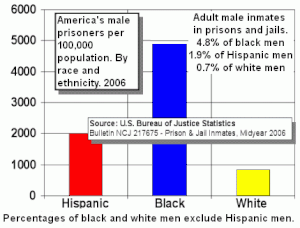This article needs additional citations for verification. (June 2010) |

In the United States, sentencing law varies by jurisdiction. The jurisdictions in the US legal system are federal, state, regional, and county. Each jurisdictional entity has governmental bodies that create common, statutory, and regulatory law, although some legal issues are handled more often at the federal level, while other issues are the domain of the states.[2] Civil rights, immigration, interstate commerce, and constitutional issues are subject to federal jurisdiction. Issues such as domestic relations, which includes domestic violence; marriage and divorce; corporations; property; contracts; and criminal laws are generally governed by states, unless there is federal preemption.[3]
Sentences are typically determined by a judge, in a separate hearing, after the jury (or other finder of fact) has issued findings of fact and a guilty verdict. In some cases after the probation department has carried out a pre-sentence investigation. Juries generally have little involvement in sentencing, except in some death penalty cases (which are exceptionally rare). [citation needed]
- ^ "Prison and Jail Inmates at Midyear 2006". Bureau of Justice Statistics. Retrieved 2022-08-23.
- ^ Black, Henry Campbell (1990). Black's law dictionary : definitions of the terms and phrases of American and English jurisprudence, ancient and modern. Joseph R. Nolan (6th ed.). St. Paul, Minn.: West Pub. Co. ISBN 0-314-77165-4. OCLC 21600991.
- ^ Black, Henry Campbell (1979). Black's law dictionary : definitions of the terms and phrases of American and English jurisprudence, ancient and modern. Joseph R. Nolan, Michael J. Connolly, West Publishing Company (5th ed.). St. Paul: West Pub. Co. ISBN 0-8299-2041-2. OCLC 4957310.